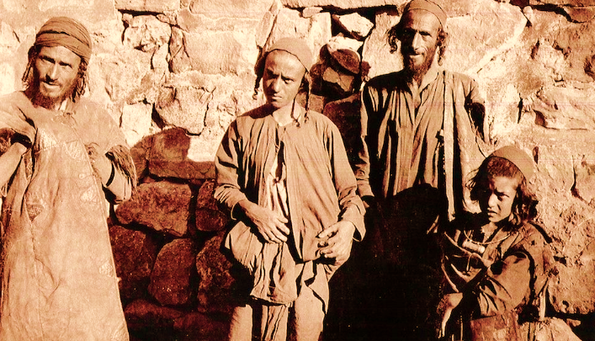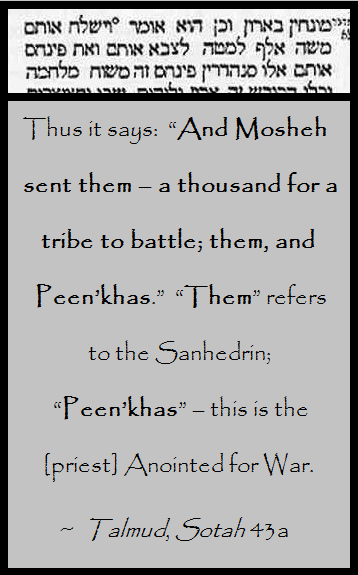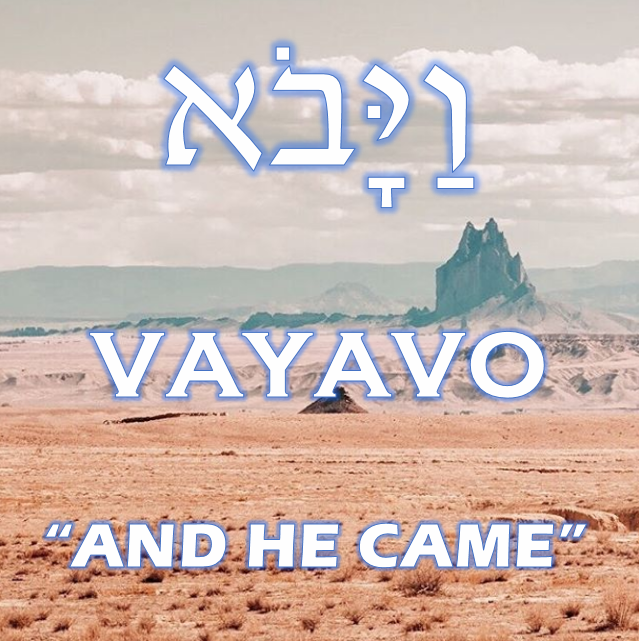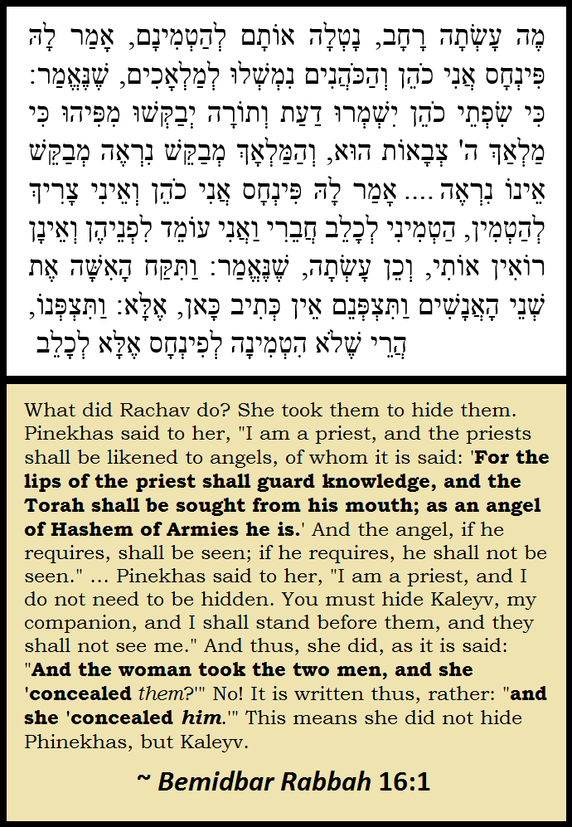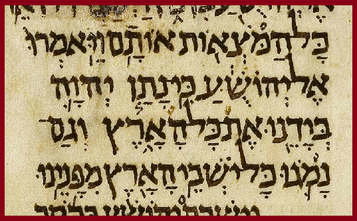THE HIDDEN SPIES
by Jeremy Chance Springfield
12/17/18
When the time came to enter the Promised Land, Israel did not plow headstrong into the thick of a landscape populated with unknown dangers. Rather, under the holy guidance of Joshua, son of Nun, the righteous successor of Moses, great care was taken in how they implemented the command to take the land. The tribes of Israel waited on the eastern side of the Jordan at Shittim, looking longingly at the land that had for long been just out of reach. What had possibly been relegated to legend and family lore was barely out of sight at last in the borders of the promised land: the land of Canaan was ripe for the conquest of the people of Israel. Although their physical eyes could not see it, the inheritance loomed before them, poised to be taken up by the Kingdom that was to come. Before their eyes Canaan was waiting to be conquered.
Using a divinely-bestowed wisdom and discernment, Joshua prefaced the faith-fueled fulfillment of the promise given to Abraham that his seed would inherit the land by first sending in a pair of spies to reconnoiter the inheritance of Israel and bring back word of what awaited. The Hebrew people’s next move was predicated on the success of this dangerous mission into a land fraught with enemies and idolatry.
The initial information is presented to us in the book of Joshua 2:1. From the relative safety of their eastern abode in Shittim, Joshua acted.
The initial information is presented to us in the book of Joshua 2:1. From the relative safety of their eastern abode in Shittim, Joshua acted.
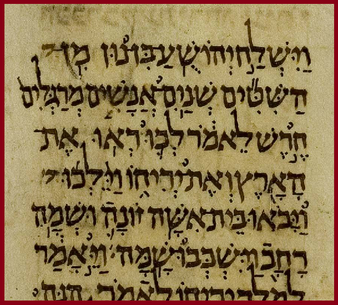
And Yehoshua son of Nun sent out from the Shittim two men – silent spies – saying, “You must go see the land, and Yericho!” And they went and they came [to] the house of a woman, a prostitute, and her name was Rachav. And they dwelt there.
The grand conquest of Canaan began with the presence of two simple men who selflessly risked their lives to discover what lay in wait for the people on the other side of the Jordan river who had endured forty years of wandering in the wilderness, and who knew the time was upon them to take what was rightfully theirs. These two men performed an exhilarating excursion into enemy territory to bring back news of the dangers that would face the people.

In order to maintain an anonymous presence among the natives of Canaan, they entered the fortified city of Jericho and sought out the last place anyone would assume a people called to holiness should be found: the house of one whom Scripture calls a harlot: Rahab! Under the scandalous roof of this woman of worldly worth, they found not only a momentary relief from the suspicious eyes of the Canaanites, but also a surprising friend in her blossoming faith in the authority of the strange Deity of the Israelites. While all the world could see in the person of Rahab was a woman of earthly pleasure, her unexpected actions towards the two spies would prove instead that appearances can be very deceiving, for she would show herself in them to be of key spiritual value to the Kingdom of Heaven. Rahab would provide for the two Hebrew spies an illicit act, indeed: her willingness to hide them declared to Israel she was the source of an unlikely friendship to the spies and their most important task, ensuring their safety and the mission’s success.

While she obviously entertained many folk from all different cultural backgrounds and walks of life, the eyes of Rahab’s heart must have seen something truly special in the spies to extend herself beyond what her trade typically entailed and risk her lavish lifestyle for two migrant men of seemingly no repute. Indeed, while her name means “Wide Open” in its original tongue (and has been viewed rather tongue-in-cheek by so many), her openly-accommodating manner was soon to reward her with an even more expansive glimpse of the reality of the Holy One – in the presence of the two spies she was about to see (and not see) the power of the Deity of Israel!
Curiously, though, the inspired text of Scripture does not preserve for us the names of the two valiant spies who risked life and limb to bring back a report to Joshua. We are left to seek that detail in another ancient Jewish source, and doing so helps us to understand a further curiosity preserved in the inspired account that we shall encounter as the story progresses.
By turning to the ancient Jewish text of Bemidbar Rabbah, we are given the information of the identity of these two men who secretively crept into Jericho. In 16:1 of that text, we read the following detail.
By turning to the ancient Jewish text of Bemidbar Rabbah, we are given the information of the identity of these two men who secretively crept into Jericho. In 16:1 of that text, we read the following detail.
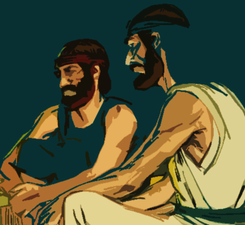
The ancient text reveals that the spies were none other than Phinehas and Caleb – both men mentioned at some length in Scripture who had proven their faithfulness to the cause of the Holy One during the forty years of dwelling in the desert. These were not simple citizens of the tribes - they were shining examples of true faith amid a generation dimmed by doubt and disobedience. The text tells us that they had been chosen by the wise discernment of Joshua to endanger their lives for the entire nation and return with word of how to proceed.
While not revealed in the plain text of the Word, the reasoning behind the ancient Jewish historical tradition for these two being the ones chosen by Joshua for the task makes total sense when one looks at the information preserved about them in the Word. It is important to observe the accounts of both of these men and see the wisdom in why they were chosen.
While not revealed in the plain text of the Word, the reasoning behind the ancient Jewish historical tradition for these two being the ones chosen by Joshua for the task makes total sense when one looks at the information preserved about them in the Word. It is important to observe the accounts of both of these men and see the wisdom in why they were chosen.
Concerning Phinehas, we read this account from the book of Numbers 25:10-13, which shows his zealous nature so well.
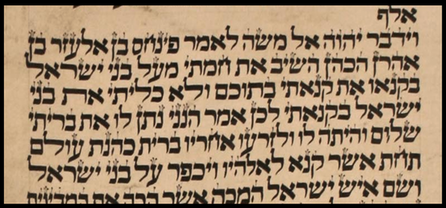
10 And YHWH spoke to Mosheh, to say,
11 “Pinekhas son of El’azar, son of Aharon the priest has turned My wrath from over the sons of Yisra’el; in his zeal was My zeal among them, and I did not finish off the sons of Yisra’el in My zeal.
12 Therefore, say, ‘Behold! I give him My covenant of peace!
13 And it is to him, and to his seed after him a covenant of everlasting priesthood, because he was zealous for his Deity, and [made] atonement over the sons of Yisra’el.’”
11 “Pinekhas son of El’azar, son of Aharon the priest has turned My wrath from over the sons of Yisra’el; in his zeal was My zeal among them, and I did not finish off the sons of Yisra’el in My zeal.
12 Therefore, say, ‘Behold! I give him My covenant of peace!
13 And it is to him, and to his seed after him a covenant of everlasting priesthood, because he was zealous for his Deity, and [made] atonement over the sons of Yisra’el.’”
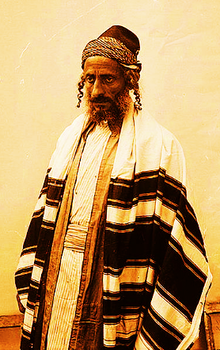
This promise of a very special priestly office for Phinehas stems from his reaction to an event of idolatry in the camp of Israel that is recorded in the previous verses of that chapter. He boldly killed another Israelite and the man’s lover who were engaged in worshiping an idol when no other person would stand up and do anything about the perversion. For that act, he was awarded a special priestly role: the Priest Anointed for War. This office was different than the ministerial roles his older family members were given. The role of the Priest Anointed for War was to go out to the battle with the soldiers of Israel and stand with them in encouragement in their attack. This role is specifically commanded in the Torah in Deuteronomy 20:1-4. Although the title is not specified, it was later designated so that no ministering priest would think it their duty unless they were of the line of Phinehas.
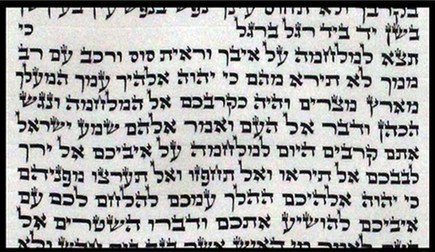
1 When you go out to war against your enemies, and see horse, and chariot – a people greater than you – do not fear them, for YHWH your Deity is with you, who elevated you from the land of Mitzrayim.
2 And it shall be when you draw near unto the war, then shall approach the priest, and speak unto the people,
3 and say unto them, “Hear, Yisra’el! You draw near today to war against your enemies. Do not [let] your hearts be soft. You shall not fear, and you shall not tremble, and you shall not have dread before them,
4 for YHWH your Deity walks with you, to war for you with your enemies, to rescue you!”
2 And it shall be when you draw near unto the war, then shall approach the priest, and speak unto the people,
3 and say unto them, “Hear, Yisra’el! You draw near today to war against your enemies. Do not [let] your hearts be soft. You shall not fear, and you shall not tremble, and you shall not have dread before them,
4 for YHWH your Deity walks with you, to war for you with your enemies, to rescue you!”
Scripture afterwards records Phinehas repeatedly going out to war with the army of Israel (see Numbers 31:6; Joshua 22:13; Judges 20:28), and it is in the Talmud, tractate Sotah 43a, that we see him named outright as officiating in that office.
It thus makes complete sense for Joshua to choose Phinehas as one of the two spies, for they were to be in a foreign land brimming with idolaters and opportunities to engage in the abominable worship of their various low deities, and thus there needed to be one present who had already proved himself faithful to the Holy One of Israel in the most extreme manner possible. He who was willing to kill a fellow Israelite for engaging in idolatry and parade his deed for all to see was not one to be tempted with similar sin. Phinehas was a logical choice to send for the mission.
Concerning Caleb, we read from Numbers 13:6 that he was one of the twelve spies originally sent by Moses into the land of Canaan at the beginning of their wilderness days. Not only that, but Caleb proved himself worthy out of all the men who reconnoitered the land in that situation, for he went where nobody else dared to go – Hebron. This is recorded in Numbers 13:22 by noting a detail in the Hebrew text that is not typically rendered in translations.
Concerning Caleb, we read from Numbers 13:6 that he was one of the twelve spies originally sent by Moses into the land of Canaan at the beginning of their wilderness days. Not only that, but Caleb proved himself worthy out of all the men who reconnoitered the land in that situation, for he went where nobody else dared to go – Hebron. This is recorded in Numbers 13:22 by noting a detail in the Hebrew text that is not typically rendered in translations.

And they ascended by the Negev, and he came until Chevron…
I direct the reader to reread the above quote and note carefully how I have worded it in my translation from the Hebrew. The unique translation that you won’t typically find in any English version is the inclusion of the term “he.” While the Hebrew pronoun used for “he” is not part of the Hebrew text, it is absolutely intended to be read this way when you understand the nuances of Hebrew grammar. The term of interest is VAYAVO, which means literally “and he came” in the singular. While the spies went as a group into the land, the nuance of the text tells us someone went alone to visit Hebron. That someone, as we will see, was Caleb! There are plural verbs referencing the movements of the twelve spies both before and after this term, so that if the Holy Spirit had intended this specific term to be read in the plural, it could have very easily been expressed via the plural form of VAYAVO’U, yet that is distinctly not the case. It is singular for a reason.
The reader may well wonder how we know that it was Caleb out of all the spies who is the identity of the “he” in VAYAVO. The answer is that almost forty years later, in Deuteronomy 1:36, as Moses is giving his last speech to the people as they prepare themselves mentally and spiritually to take up the task to inherit the land, he reminds them that no adults from the initial generation who came out of Egypt have survived to possess the land, except for Joshua, and one other person – which includes a detail of importance to us.

…except Kaleyv, son of Yephunneh – he shall see it, and to him I shall give the land which he trod upon, and to his sons, because of which he was fully after YHWH.
The detail here is that Caleb would enter and possess the land, and it would be specifically the place he trod upon – where he went. He was not going to be given the entire land, of course – but specifically a place to which he traveled. Now, the text here doesn’t give the entire portrait, although it helps. We must turn to Joshua 14:13 for the last bit of information that puts it all in focus for us.
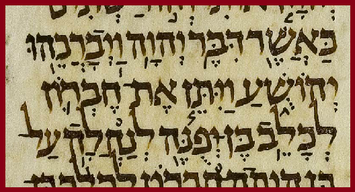
And Yehoshua blessed him and gave Chevron to Kaleyv son of Yephunneh for an inheritance.

The place given to Caleb was Hebron - the site to where he alone walked! It thus also makes complete sense for Joshua to choose Caleb to aide Phinehas in his task. Caleb had proven his loyalty to Moses and to Joshua in that original foray into the land years before and had gone above and beyond the task given to him by traveling solo to Hebron – the former dwelling place of the patriarch Abraham to whom the land of Canaan was promised. Caleb was the only one left besides Joshua who had personally experienced the pagan cultures of the land, and so would be a great benefit to their new trek across the plains to gather fresh intelligence of what awaited them when they crossed the Jordan. He, too, was a perfectly logical choice to accompany Phinehas on the dangerous mission into the land of Canaan.
Aided now with the historical information of the identity of these two spies, we can move forward to see a further astonishing detail in how the Holy One helped His people in their necessary but dangerous deed. The account continues in Joshua 2:2-3.
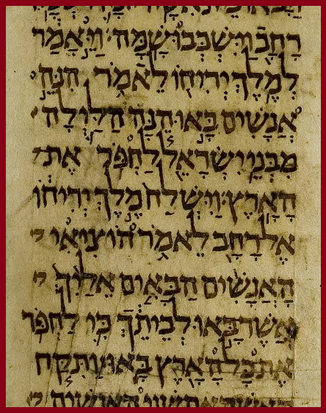
2 And it was said to the king of Yericho, saying, “Behold! men came! Behold! this night – from the sons of Yisra’el, to explore the land!”
3 And the king of Yericho sent to Rachav, saying, “You must bring out the men who came unto you, which entered to your house, for to explore all the land they have come!”
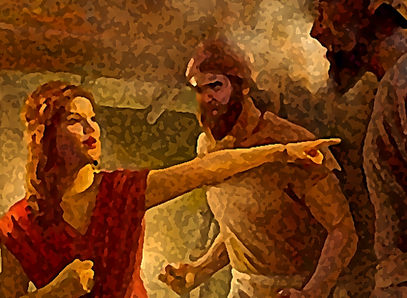
It did not take long for the covert Israelite operation to be found out. Phinehas and Caleb were somehow discovered to be Hebrews, unable to hide from the cunning eyes of Jericho’s inhabitants. Word got out and made its way to the king, and he had no patience for one harboring the Israelite invaders. The king sent his men to retrieve the trespassers from the harlot’s house. Rahab was immediately placed on the spot to produce the two spies at once. She could have given them up and claimed no knowledge of their true identities or purposes, but she proved herself faithful and took a different course of action. In Joshua 2:8-14, the account provides a flashback of what happened before they were taken to the roof to hide. There it details the promises they make to each other, since she is able to see the truth of the situation – Israel will be victorious and take the land, and she desires to be a part of that new world. Rahab sees what nobody else can see. She exhibited surprising foresight and put her own life in danger to help hide them on the grounds of her own home. Joshua 2:4-5 tells us this simple statement, but also provides an amazing detail that changes how the story is understood.
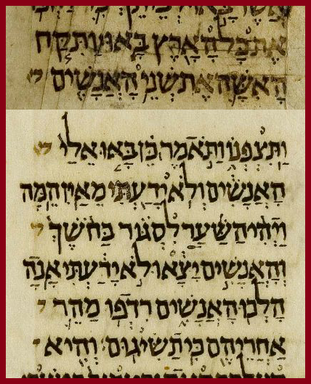
4 And the woman took the two men, and concealed him, and she said thus: “Men came unto me, and I did not know from where they were,
5 and it came to be at the closing of the gate, at dark, then the men went out, and I do not know if the men went. You must go! Pursue quickly after them, for you shall overtake them!”

Rahab utters a blatant lie to her fellow citizens of Jericho. She looked her countrymen in the eyes and uttered complete deceit in order to save the lives of two men who had promised her the hope of salvation. She deceived them and did not reveal that she had them in her home at that very moment. This unlikely act displayed a new allegiance to the Holy One and His plan for the land she called home. Her choice tells us she saw beyond the life familiar to her to a world where she could possibly be seen instead as someone of a purer value, who was willing to do whatever it takes to be a part of a Kingdom that would value her for more than what her flesh had to offer. In this perception of the truth, Rahab could see what had to happen: she must betray her country to give the spies the opportunity to return to their people and bring her a rescue from a life of ultimate despair.
In all of this is a significant detail to consider that is rarely ever discussed or made clear in translations. The Hebrew of the above quote is quite clear on what she did for the two spies – she concealed him. The text uses the singular word VATITZPENO “and concealed him.” Had the writer intended the plural form, it would have been written VATITZPENEYM “and concealed them,” but that is not how it was preserved.
What is going on with this strange grammatical reading from the Hebrew text?
Once again, by returning to the help of the ancient Jewish text of Bemidbar Rabbah 16:1, we are given the information that helps make sense of this bizarre detail in the inspired Hebrew text. In a passage just a few sentences after our initial quote from the text, we find an astounding revelation.
Once again, by returning to the help of the ancient Jewish text of Bemidbar Rabbah 16:1, we are given the information that helps make sense of this bizarre detail in the inspired Hebrew text. In a passage just a few sentences after our initial quote from the text, we find an astounding revelation.

In a truly astonishing piece of information, we are told in the text of Bemidbar Rabbah that the rabbis of old understood from tradition that the admittedly strange Hebrew reading was intended to signify that Phinehas experienced a miracle on the rooftop and was temporarily made invisible to everyone - including the men from Jericho who came to search for them by order of the king!
Since the uncontested reading in the Hebrew says that Rahab only concealed him – meaning she did so for distinctly one person – it was deduced through further careful nuances of the Word that it was Caleb who was concealed on the roof while Phinehas was merely unable to be seen! We do know that even Phinehas eventually did lay down with Caleb in the place she designated for them, as Joshua 2:8 makes clear. However, the concept of his invisibility still holds despite whether he eventually lay prostrate or not - the text records for us that only one person was actually hidden by Rahab on her rooftop!
Since the uncontested reading in the Hebrew says that Rahab only concealed him – meaning she did so for distinctly one person – it was deduced through further careful nuances of the Word that it was Caleb who was concealed on the roof while Phinehas was merely unable to be seen! We do know that even Phinehas eventually did lay down with Caleb in the place she designated for them, as Joshua 2:8 makes clear. However, the concept of his invisibility still holds despite whether he eventually lay prostrate or not - the text records for us that only one person was actually hidden by Rahab on her rooftop!
The proof of this is taken from the book of the prophet Malachi 2:7, where we are told that the priest is as an angel of the Holy One. This statement from the prophet is seen as necessitating that the spiritual gifts of an angel are thus also gifted to the Levitical priest who likewise does the will of the Most High. While it might seem a stretch to some to make the comparison, it is yet a valid connection made from just the texts of Scripture itself, and so cannot be readily dismissed. The question that would need be asked is if Scripture supports the idea that angels can be visible or invisible at any given time. The answer is a resounding yes!
The first instance is found in the Torah itself recorded specifically in Numbers 22:31, in the account of Balaam and his donkey, who alone can see the angel in the path, until the Holy One allowed the misled prophet to see with truly unveiled eyes what lay before him in the road.
The first instance is found in the Torah itself recorded specifically in Numbers 22:31, in the account of Balaam and his donkey, who alone can see the angel in the path, until the Holy One allowed the misled prophet to see with truly unveiled eyes what lay before him in the road.

And YHWH unveiled the eyes of Vil’am, and he saw the angel of YHWH standing in the path, and his sword drawn in his hand, and he bowed down, and bowed his face.
The second major instance is recorded for us in 2nd Kings 6:17, where the prophet Elisha prays for his companion to see the reality of the angels that surround them.
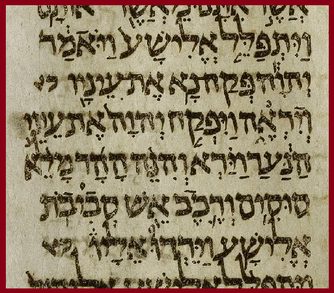
And Elisha prayed, and said to YHWH, “Open, please, his eyes, and he shall see!” And YHWH opened the eyes of the youth, and he saw, and behold! the mountain full of horses and chariots of fire around Elisha!
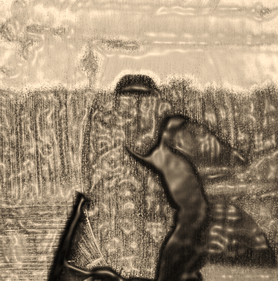
There are other passages that could be brought forward that seem to show the sudden visual appearance and disappearance of angels in the sight of men, but these two are most blatant in their wording, and have been thus included here for brief examples.
Therefore, as Malachi 2:7 mentions a link between angels and priests, the ancient biblical commentators and sages were able to deduce from the unique Hebrew wording that the Holy One miraculously altered the visual appearance of Phinehas so that he was invisible to their pursuers! Perhaps the Most High performed this miracle because there was not enough of the flax to cover them both sufficiently that the text goes on to tell us in Joshua 2:6 that she hid them with on the roof. For whatever reason, the Holy Spirit chose to include the strange detail of the concealing of only one of the spies, leaving the other to be missed by the king’s men by miraculous means!
Therefore, as Malachi 2:7 mentions a link between angels and priests, the ancient biblical commentators and sages were able to deduce from the unique Hebrew wording that the Holy One miraculously altered the visual appearance of Phinehas so that he was invisible to their pursuers! Perhaps the Most High performed this miracle because there was not enough of the flax to cover them both sufficiently that the text goes on to tell us in Joshua 2:6 that she hid them with on the roof. For whatever reason, the Holy Spirit chose to include the strange detail of the concealing of only one of the spies, leaving the other to be missed by the king’s men by miraculous means!
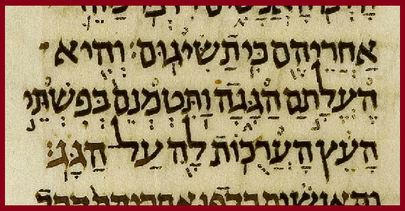
Yet, she had sent them up to the roof, and hid them with the flax of the stalk she had laid upon the roof.
At first reading in the English, the text seems to contradict the idea that only one was hidden, but upon a closer appreciation of the Hebrew term for “hid” in this passage, it becomes clear that something slightly different is being stated. The term is VATITMENEYM, and signifies something that has been “stored” or “put away” for preservation to happen. In understanding the sense of the term, it is really just suggesting that she stored them on the roof with the flax in such a way that one of them would be truly “concealed,” as the former term in Joshua 2:4 literally conveyed. Therefore, the text here in 2:6 tells us where they were placed in her home, while the former text only explained that one of them was concealed from sight due to Rahab’s actions.
The chapter goes on to detail the fruitless search for the two spies by the men of Jericho, and the vow made by Rahab and the Hebrews that if she made sure they safely exited the city and returned in conquest without anyone knowing of their plans, that she and her family with her in her home would be spared the certain death that awaited all inside Jericho. The text tells us they make it out of the city and return eventually to Joshua in Shittim unharmed. It is there they give their holy leader the good news, recorded in Joshua 2:24.

Due to the saving miracles of the Most High, the two spies were able to complete their mission and bring hope to the people waiting to inherit the land. The miracle performed for the spies in Rahab's midst showed that the world is not ruled by what we can see, for the unseen has its own important part to play in how life develops. The unseen Kingdom of the Holy One was poised to make itself known to the inhabitants of Canaan, and there was no stopping what physical and spiritual changes were about to happen in the land. The presence of the spies proved to Rahab that with the eyes of faith, looking past the physical and focusing on the spiritual, she could see what could not be seen and play a part in the coming transformation of the promised land. They showed her that she didn’t have to be able to see it with her eyes to believe it.
The Kingdom was coming!
The Kingdom was coming!
All study contents Copyright Jeremy Chance Springfield, except for graphics and images, which are Copyright their respective creators.
